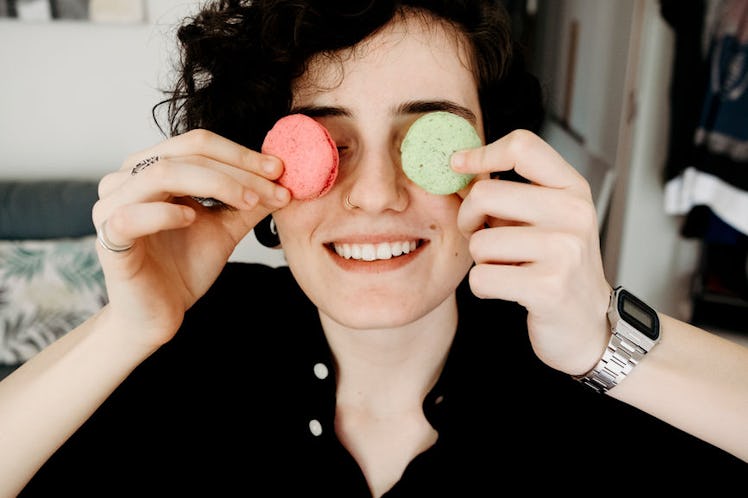
Food Experts Reveal What's Probably Missing From Your Diet If You Never Feel Full
You know that feeling when you've just eaten a meal, and yet you're still completely famished by the time you put your fork down? Yeah, same, girl. It's a little unnerving, especially if it happens a lot, and if you're anything like me, it keeps you up at night wondering whether there's some hangry, alien-worm in your stomach that's stealing all your food. Like, all you want to know is why you never feel full after eating, but of course, your brain immediately chalks it up the creepiest possible explanation. So, assuming there's not some epic sci-fi situation happening in your belly, what exactly is the deal?
According to registered dietitian Katherine Brooking, MS, RD, co-founder of the blog Appetite For Health, if you're still hungry after eating, it's likely that you're not getting enough protein and fiber in your diet. "What you eat can play an important role in feeling satisfied after a meal," Brooking tells Elite Daily over email. "Both fiber and protein can help you feel full for longer."
In terms of specific foods that'll help you feel full after you eat them, the dietitian recommends "protein-rich choices" like eggs. "Eggs are perfect because they are inexpensive, easy to prepare, and, if you like them hard-boiled, they're portable, too," she explains. As for your fiber, Brooking says oats are a quick and easy way to go: "Oats may help keep you full during the morning, particularly when eaten as part of a balanced breakfast," she says.
However, if you're on top of your fiber and protein intake, another potential reason why you never feel full might have something to do with your one true love: sugar. See, if you eat a lot of processed, sugary foods, Carolyn Dean, MD, ND, a medical advisory board member for the Nutritional Magnesium Association, says this can keep you from feeling full and satisfied after a meal because you aren't actually getting the nutrients your body really needs. Plus, Dr. Dean tells Elite Daily over email, the simple carbs and sugars in these types of foods can "wreak havoc on blood sugar levels," giving you an instant energy boost, followed by a quick crash, as well as resulting feelings of hunger and cravings. And, look, this doesn't mean you have to cut out sugar or processed foods entirely, but it does mean you have to find room in your diet for those treats, as well as foods that your body can really use for long-lasting energy, like fatty fish, sweet potatoes, brown rice, hummus, fresh fruits and veggies, etc.
In addition to making sure your overall diet is balanced out with the nutrients your body needs to thrive, Dr. Dean says she's also a big proponent of magnesium. If you're always hungry, even after eating a full meal, she explains, it's possible that you're not getting enough of this metabolizing mineral. "Magnesium is necessary for the digestion and absorption of proteins, fats, and carbs, and facilitates the production of ATP, the energy unit for your cells," Dr. Dean tells Elite Daily.
So, perhaps a magnesium supplement could help you feel more satiated after your meals, though it's best to check in with your own doctor about that to be sure it's right for you. As for foods that have a lot of magnesium, Healthline recommends dark chocolate (yum), legumes, nuts, bananas, and whole grains, among other foods.
Dr. Dean also suggests, for a diet that'll curb those unexpected cravings, looking for "healthy fats such as omega 3 fish oils, wild salmon, avocado and avocado oil, and coconut oil" in the grocery store. "Additionally, [your diet] should include organic protein (animal or vegetarian), complex carbohydrates like beans and grains, nuts and seeds, and a minimal amount of low-glycemic-index fruits, such as blackberries, raspberries, or blueberries," she tells Elite Daily.
Hey, at least she listed a whole bunch of super delicious foods, right? Maybe staying full won't be so hard after all.